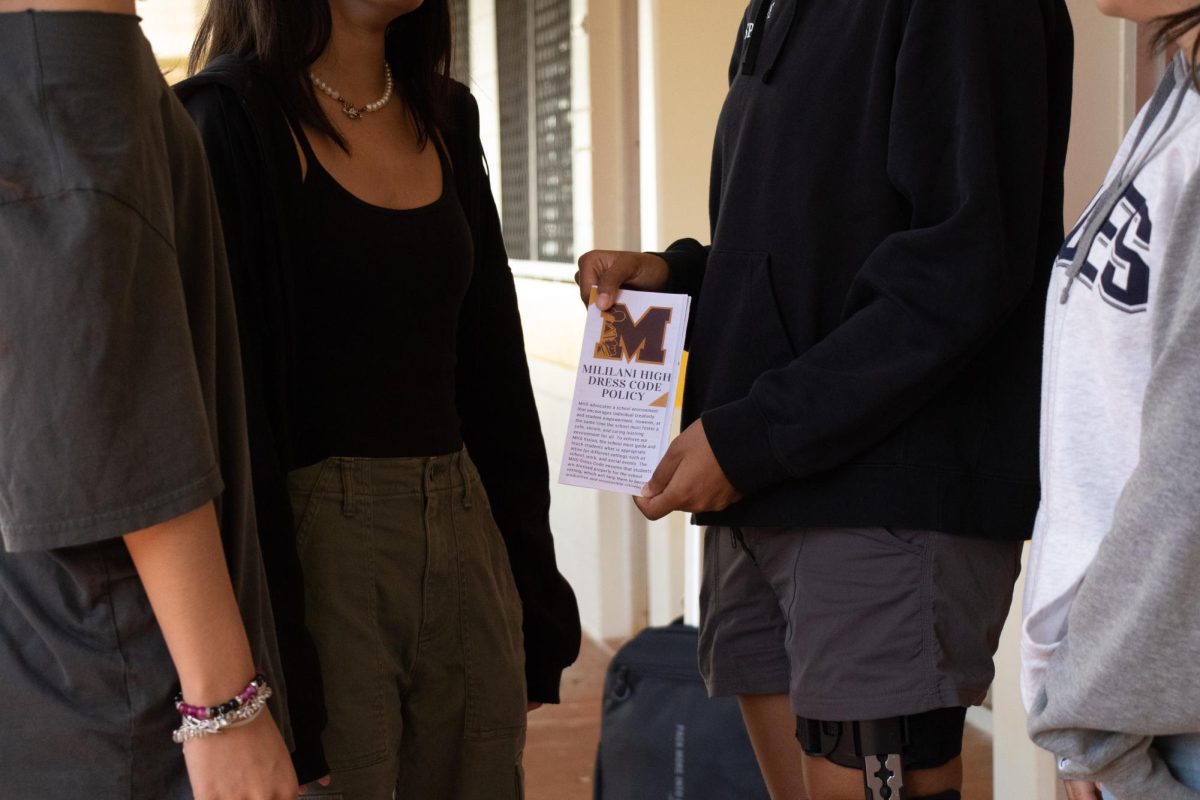Cracking the Competition: Coding Team Places First at HACC
December 9, 2019
Although it’s not recognized as an official club, the Mililani coding team has experienced great success within its past few years. Over the course of two weeks, the coding team worked to create a web application for the Hawai’i Annual Coding Competition (HACC). After finishing the application, they presented their project at Hawai’i Pacific University and placed first in the high school division.
“Quite honestly, I think my favorite thing about HACC is just when you get to kind of see the students start and they’re kind of worried about if they can do this task or not and then you kind of just see each of them really grow in terms of not only just their coding skill, but their people skills — you know, your soft skills, dealing with each other’s personalities and learning to understand that some people have other commitments,” said coding team coach Blaise Hanagami.
Every year, the theme and guidelines of HACC changes. This year’s theme focused on sustainability in Hawai’i. “So for the HACC, we created a meter checker. Basically, we grabbed the data that we got from Hawaiian Electric Company (HECO) and then we try checking for anomalies in the data to see if a station was down for their car chargers or for their electrical vehicles. And we also were able to create predictive data with it and be able to predict when congestion was going to occur. And we also developed a way so they (HECO) can view all this data as well,” said Senior Kobe Uyeda.
Junior Shane Parslow added, “So they (HECO) wanted us to make a program for them that will detect when certain parts of it are broken and we can tell them, ‘The credit card readers broken,’ and they can just see it on the program — they can easily see the part (that) is broken.”
Normally in HACC, coding teams are often composed of very few students. However, for this year’s MHS coding team, there were 10 students in comparison to last year’s seven. This allowed the students to improve the quality of their project. “One of the things that we kind of noticed after we took a step back and looking at our team of 10 was that even though the team was large, the more veteran members who were a part of last year’s HACC — they made a priority to make sure that anybody and everybody who was interested in working on a real world project that dealt with coding, no matter what their experience was, had an opportunity to participate,” said Hanagami.
“It was also important — the number of people that we had. (With) the extra people that we had, I think we really dedicated people to tasks really efficiently. So we definitely made use of the extra members that we had this year,” said Parslow
Throughout the process of developing the meter checker, the team ran into various challenges. However, with communication and teamwork, the group was able to resolve them. “We had trouble deciding how we would store the data that they gave us — we had a few options. But we ended up going with using an SQL (Structured Query Language) server because it works well with the framework that we’re using,” said Parslow.
Hanagami added, “I think (one of) the challenges that we ran into was definitely time constraints. We were here (at MHS) all hours of the day — all the way from the morning (and) some days we’re here to maybe like 11 at night. And also trying to align schedules. That was difficult.”
One particular aspect of HACC is its connections to real world problems. For this year’s competition, the MHS coding team utilized a database often used in the coding industry. “The fact that we used an SQL database as our format was very interesting, because it’s not something that I think any of us had worked with before. And it’s something that’s used very often in industry,” said Parslow.
For some of the team members, this was their second time competing at HACC. The returnees utilized their experience to help the team with this year’s project. “So last year, we competed for the HACC too and we created another system for (the University of Hawai’i at) Manoa to check their meter usage of electricity at there — on their campus to see which building is drawing the most energy than the other buildings,” said Uyeda. Parslow added, “This year, we had a lot of less experienced people. So it’s definitely a learning experience for them. It was really nice to be able to train them and help them learn a lot more about programming.”
Competing at HACC helped many of the students expand their knowledge of programming. Aside from the educational aspect, students were also able to improve their communication and teamwork skills. “I’ve definitely learned a lot more about programming from this club. Before, I didn’t know too much about programming, but I’ve learned a whole lot from this. And as students, it really helped me learn to manage my time because we stayed late quite a few times — we stayed until 10 (at night) sometimes,” said Parslow.
Uyeda added, “When I was able to be here, I made sure I used my time very wisely instead of just goofing off. But it also taught me more than — it taught me that to be a good manager, you actually have to make sure everyone’s still doing the job that they were supposed to do. And that way, you make sure that you’re going to still be on task in the end.”
In the future, the coding team hopes to compete in other programming competitions. Although HACC takes place only once a year, the team has plans to routinely meet to continue improving their skills. “So a couple of things that we’re looking at is that the students really enjoyed the experience of kind of being under the gun and working on a real world project. So we’re currently trying to look for different online hackathons that we can enter into,” said Hanagami.
Parslow added, “We are also trying to set up a way for us to do another hack(athon) but on a local level for Hawai’i. That’s still being worked out, but that’s what we’re trying to get to.”
As a result of placing first, the coding team was awarded a check of $500. The prize is to be given to the school for future use. For the full timeline of the coding team’s project, visit https://devpost.com/software/shc.



